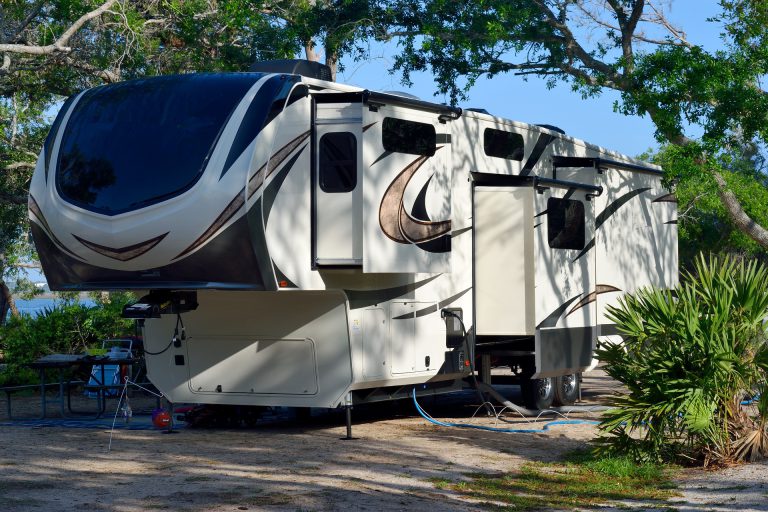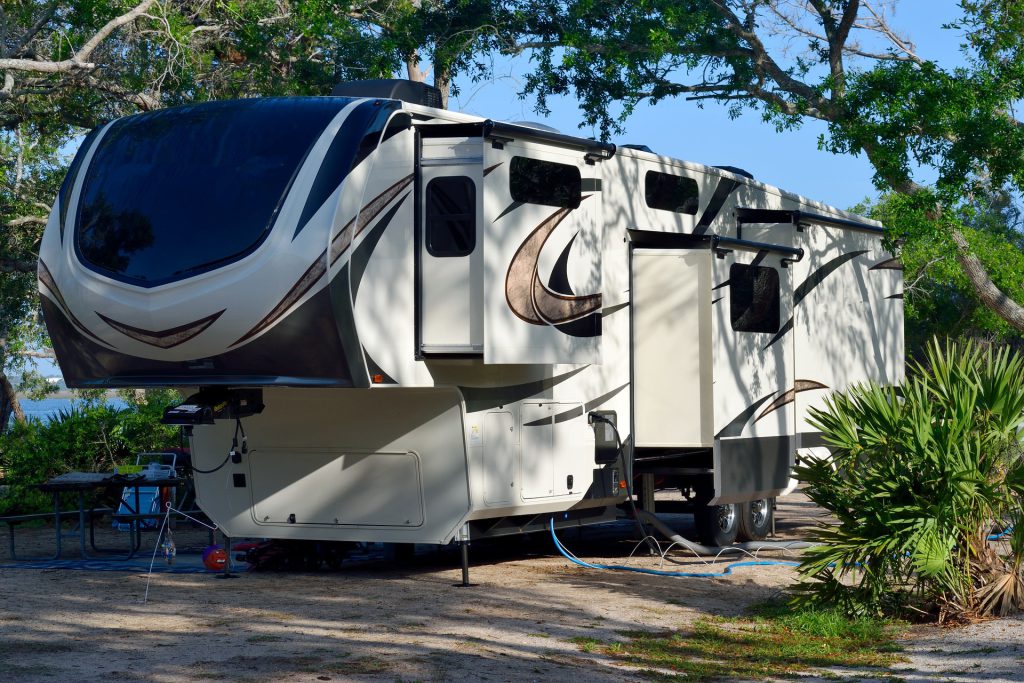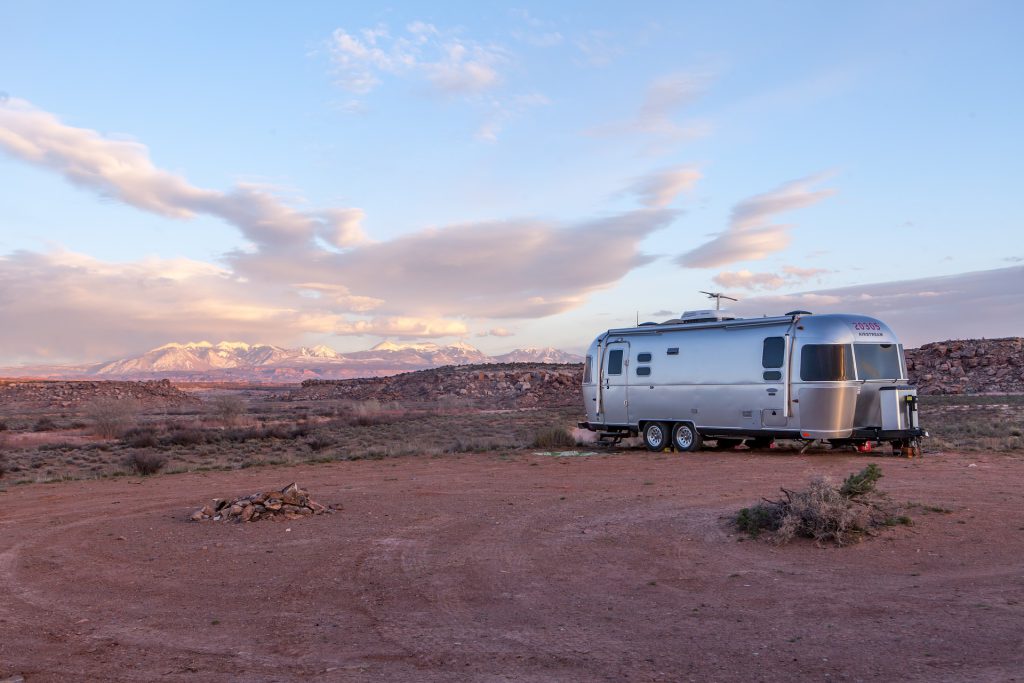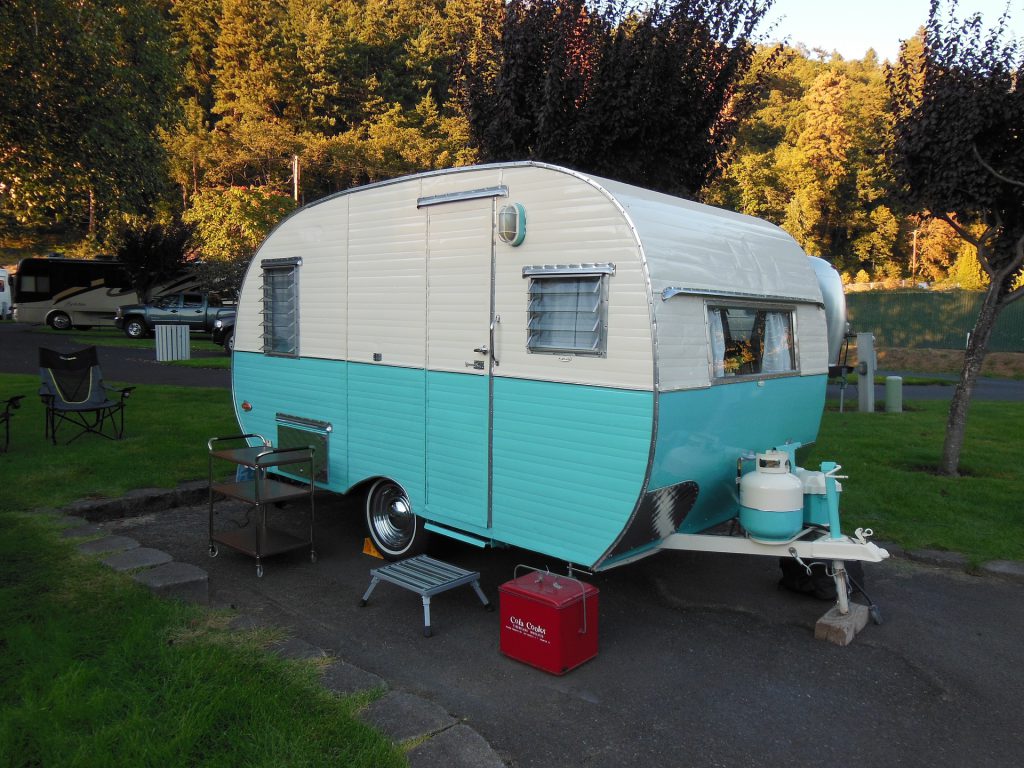
Shopping for a new RV is tough. Whether you’ve owned a rig for years or you’re shopping for your first ever tiny home-on-wheels, there is a lot to consider and know before making this huge purchase. The first question is usually whether you want a motorhome or a trailer of some sort. However, even with that question answered, there is still the question of what type of motorhome or trailer you’re looking for.
When it comes to motorhomes, there are the options of class A, class C, or potentially even a tiny class B. As far as trailers go, you’re looking at either a fifth wheel or a travel trailer.
Discussing all of these options would be overwhelming. Therefore, we are going to use this article to focus on the fifth wheel vs travel trailer debate. If you’re waffling between these two pull-behind RV styles, this is the article for you.

What is a Fifth Wheel?
Let’s begin by discussing what exactly separates fifth wheels from standard travel trailers. The most prominent feature of a fifth wheel is its unusual shape. This shape comes from the way the trailer hitches to your truck. You see, the fifth wheel has to jut out over the back of your tow vehicle, where it hitches to the bed of the truck rather than the bumper. This creates a very distinctive look.
Usually, this jutting-out portion of the trailer is home to the master bedroom, creating a nice, private space for sleeping. However, it is possible for this portion to be home to something else, especially if the trailer has been remodeled in any way.
There are many makes and models of fifth wheels out there. However, whether you invest in a luxury fifth wheel or the least expensive model on the market, you can count on this unusual shape. For more, see our guide to fifth wheels.

Travel Trailers Basics
Now that you know what a fifth wheel is, let’s discuss the travel trailer. A travel trailer (also known as a bumper pull) tends to be a bit shorter than a fifth wheel. This is because it doesn’t need to jut out over your truck bed for hitching purposes. Instead, the trailer is hitched to the back of the truck or van where your factory-installed hitch receiver can be found. This is what gives this style of trailer the name “bumper pull”.
Because travel trailers have a more versatile shape, you never know what the floor plan may be like. There is no “normal” in terms of where the master bedroom is, and there may even be no master bedroom at all.
Travel trailers come in a variety of sizes, but you can usually count on them having a very standard, almost box-like shape with no parts jutting out when all slides are pulled in.
Fifth Wheel vs Travel Trailer
Of course, knowing how to distinguish one of these trailer types from the other isn’t much help when trying to make a decision. What’s more important is knowing fifth wheel vs travel trailer pros and cons.
Thanks to the different hitch types, sizes, and shapes of these two types of RVs, there are a number of pros and cons to take into consideration. Here are some of the most important ones.
Size, Weight, and Height
In general, travel trailers are smaller, lighter, and shorter than fifth wheels. This is ideal for those who prefer to tow with a smaller vehicle or like to have the ability to camp in smaller spots. It’s also great if you tend to drive through cities where low clearances could be a problem.
That said, the larger size of a fifth wheel is also quite handy in that it offers more living space. For this reason, a fifth wheel might be the best bet for someone who will be living in their rig full-time.
Vehicle Type
Obviously, the weight of your trailer needs to be under the towing capacity of whatever vehicle you plan to tow with. However, another thing to consider when it comes to matching your RV to your vehicle is the type of vehicle you wish to drive.
While a fifth wheel will require a pickup truck with an open bed, a bumper pull can be towed with a truck—with or without a camper shell—or a full-sized van. This is great news for those who travel with lots of kids or those who wish to have covered storage in the back of their truck.
Ease of Towing
Ask anyone who has towed both a travel trailer and a fifth wheel, and they will be quick to let you know that a fifth wheel is easier to tow. This is thanks to the way the trailer connects to the truck, which gives you a much better turn radius and really helps keep the trailer under control, even in windy conditions.

Other Things to Consider: From Small Travel Trailers to Enormous 5th Wheels
No matter where you end up falling in the travel trailer vs fifth wheel debate, there are other things you’ll want to think about when choosing the specific trailer you want to buy. These considerations apply to all RVs, so make sure you keep them in mind throughout your shopping experience.
Floor Plan
Because RVs are such tiny living spaces, a good floor plan is essential in making sure you feel comfortable in your little house-on-wheels. For this reason, you will want to carefully consider the setup in any RV you plan to buy.
Features
Both travel trailers and fifth wheels have options for some pretty cool features. Think carefully about what features are important to you and which ones you can live without, and pick your trailer accordingly.
Build Quality
In general, fifth wheels tend to be of slightly higher quality than travel trailers. That said, this is only a general rule, and higher-end luxury travel trailers can far surpass many fifth wheels in terms of build quality.
In any case, you will want to carefully assess the build quality of any fifth wheel or bumper pull you’re considering to make sure it will last for years to come and retain its value.
Price Point
Obviously, price point does also matter. Travel trailers do tend to be cheaper than fifth wheels overall, but this applies mostly to the lower-end travel trailers that you likely won’t want to waste time or money on anyway. Higher-end models—such as Airstream travel trailers—are (unfortunately) just as expensive as their fifth wheel counterparts, and finding a balance between a good price and good quality is a must.
Of course, you’ll also want to ensure you choose a trailer size and weight that your tow vehicle can handle, and that you feel comfortable towing and parking with.
Hopefully, this has helped you decide which type of RV is best for your needs. With this knowledge, you can start shopping right away so you can hit the road as soon as possible!
